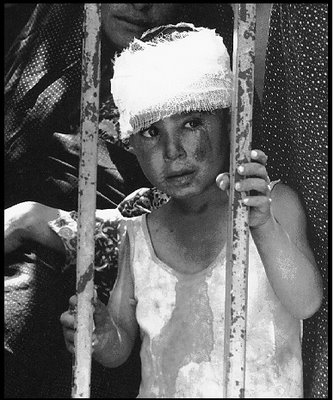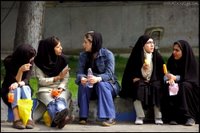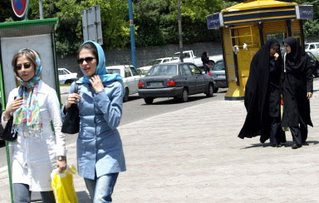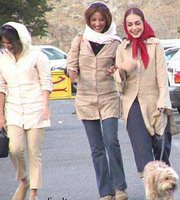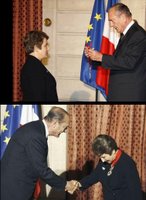
Saddam is on death row, the heads of Iranian and Iraqi states embrace amicably over talks to stabilize Iraq, America is still considering Iran to be the axis of evil, Israel insists that Iran is dangerous, and many do not recall (or mention) that the US supported Saddam in the war against Iran, nor that Israel sold weapons to both. Kamin Mohammadi reminds us of the forgotten victims of Saddam's chemical attacks on Iran
Iranians are the first civilians in the world to experience chemical bombs!
The mustard-gas bombs dropped on Sardasht on that afternoon were the first time a chemical weapon was used on a civilian town. In the following months, Saddam Hussein’s troops would drop these deadly bombs on several other villages in Iran as well as on Kurdish settlements in Iraq itself, including the infamous bombing of Halabja.Source of pictures
...
Mustard gas’s chief assault on the body is grave chemical burns. It affects the respiratory organs, eyes and skin within hours.
...
The bombing of Sardasht was at the start of a devastating campaign during the Iraq-Iran war. Saddam’s bombs claimed more than 100,000 Iranian civilian casualties. The gas agents had been developed to wipe out more people over a wider range than their predecessors. A by-product of this approach was that the noxious, insidious nature of the chemicals used ensured many of his victims died a very slow, very painful death.
Thus, those who have survived still live under the cloud of the bombs. The gas effected their DNA, caused long-term respiratory problems, eye and skin problems as well as immune system disorders, psychological disorders, genetic disorders, and probably cancers. There is also anecdotal evidence that some of the problems can be passed on to children.
...
Since Saddam Hussein was in direct violation of The Geneva Protocol of 1925, Iran complained bitterly to the international community, and though several UN missions were dispatched to Iran, only two UN resolutions addressed the chemical attacks, both weakly worded and failing to make explicit Iraq’s violation of the protocol. One of the resolutions didn’t even name Iraq as the originator of the attacks on Iran and another was not issued until after the ceasefire in the autumn of 1988.
It is this failure by the international community to support Iran against these illegal attacks that is in part responsible for Iran’s current defiance on the nuclear issue.
...
Although, in the standoff between Iran and the US that is currently taking place over the nuclear issue, Iran is seen as the potential aggressor, in reality, Iran’s experiences in the war have hardened its position.
But far away from these high-octane political wranglings, the people of Iran continue to try to live their lives within the uncertainty and psychological warfare employed by both sides, including those still physically devastated by the effects of the war and the unprovoked chemical attacks on innocent Iranian civilians. And what strikes them as ironic is that they are the only people in recent history to have directly suffered the effects of Weapons of Mass Destruction, and now they are painted as part of a country that is the West’s greatest enemy ...
Also see AllBlog video post of Rumsfeld and Saddam in action
